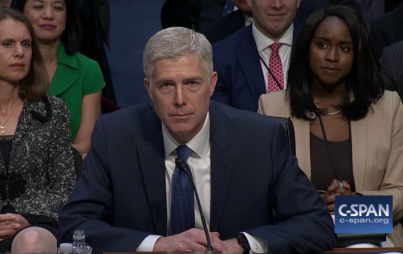
Credit: Thinkstock
United Parcel Service Driver Peggy Young was likely more-than-ready for a host of changes—bodily and otherwise—when she first learned she was pregnant. But leaving her job wasn't one of them.
After a doctor advised that Young not lift more than 20 pounds while pregnant, she asked to be reassigned to light duty. Instead, UPS put her on unpaid leave. This action prompted Young to leave the company, and then—citing protection under the 1968 Pregnancy Discrimination Act (PDA)—to sue. Now, this controversial case has reached the Supreme Court, where it is being debated on the national stage and raising new questions about sexism in the workplace.
Young's case has garnered media and legal attention in part because of the larger, looming issues it touches on—namely, how pregnant women and their bodies should be viewed and treated.
Pregnancy Discrimination On The Rise
While Young's case is currently experiencing a fever-pitch of visibility, her story is far from an anomaly. The 2009 case Heather Wiseman v. Wal-Mart Stores, Inc. revolved around a pregnant sales associate in Salina, Kansas, who suffered from bladder and urinary infections, and was advised by her doctor to carry a water bottle to stay hydrated. When she was repeatedly denied the right to do so, and ended up hydrating anyways, she was fired on account of "insubordination."
In 2007, an activity director at a nursing home in Valparaiso, Indiana, was let go when told her bosses she could no longer do heavy lifting or other strenuous activities—on her doctor's orders so as not to suffer a second miscarriage.
Beyond the anecdotal, there is empirical evidence of persistent discrimination as well. According to the Equal Employment Opportunity Commission, "in the years since the PDA was enacted, charges alleging pregnancy discrimination have increased substantially," and "discrimination complaints have risen at a faster rate than the steady influx of women into the workplace . . . [which] suggests that pregnant workers continue to face inequality in the workplace."
According to the National Women's Law Center, charges of pregnancy discrimination filed with the EEOC rose from 4,160 in FY 2000 to 6,119 in FY 2010. (Interestingly—in a case of racism colliding with sexism—claims by women of color jumped 76 percent between fiscal years 1996 and 2005, accounting for much of the 25 percent increase in pregnancy discrimination allegations during that same period.)
So what gives? And could the PDA itself be to blame?
Laying Down The Law
PDA's primary aim is simple and ostensibly sound: "prohibit sex discrimination on the basis of pregnancy." Specifically, it states:
"The terms 'because of sex' or 'on the basis of sex' include, but are not limited to, because of or on the basis of pregnancy, childbirth, or related medical conditions; and women affected by pregnancy, childbirth, or related medical conditions shall be treated the same for all employment-related purposes, including receipt of benefits under fringe benefit programs, as other persons not so affected but similar in their ability or inability to work . . ."
The problem with this is that it demands a comparison between a pregnant woman and another person with a temporary disability—and this strain for neutrality fails to address pregnancy as something entirely unique. It is, after all, not a disability. In the shrewdly titled Pacific McGeorge School of Law paper "Until Men Bear Children, Women Must Not Bear the Costs of Reproductive Capacity," Mayon Oyoung argues:
"A major problem with current [PDA] law is that there is no similarly situated class to pregnant women. In pregnancy and female reproductive issues, 'there can be no precise comparator by reason of the different reproductive capacities of men and women . . . .' Because symptoms and conditions vary among pregnant women, and even between pregnancies for the same woman, finding a similarly situated non-pregnant person is often not possible. Many legitimate pregnancy discrimination claims fail due to the inability to find a legally acceptable comparator."
UPS's strain for "neutrality" is even more dubious. The company's lawyer, Caitlin Halligan, has argued that the company was simply striving for fairness by extending the same rights to Young as it would to anybody else injured off the job. But is being pregnant really the same as getting an off-the-clock injury? And doesn't this, in a sense, tell women it's their "fault" for getting pregnant, and not the company's? Framing pregnancy as a synonymous condition to bodily injury is a dangerous and erroneous mindset to perpetuate.
Justice Samuel Alito took this line of thinking a step further when he asked if there was "really a dispute that if a UPS driver fell off his all-terrain vehicle" at home on the weekend, he would not get a "light-duty" accommodation while he recovered from his off-duty shenanigans.
Let's be clear here: Getting pregnant is not akin to taking a joy ride on an ATV. It's not something women to do to let off steam on the weekend, but a deeply personal choice bound by profound responsibility. It's also something we like to call a biological necessity. The fact that a Supreme Court Justice was so dismissive of pregnancy reveals a deep bias and profound lack of understanding that is likely at the heart of enduring discrimination.
And yes, this lack of understanding and inability to parse out the differences between pregnancy and off-duty injuries seems to be distinctly gendered. Men like the male justices and UPS bosses—who have the luxury of knowing, on an instinctual level, that they will never have to endure the burden of child-bearing—have taken the most stringent stance against protections for pregnant women. It should come as no surprise that the two justices "most sympathetic" to Young's plight were women—Ruth Bader Ginsburg and Elena Kagan—though Kagan herself has never even been pregnant.
(Interestingly enough, pro-lifers are rallying around Young, insisting that life deserves to be fiercely protected vis-a-vis the protection of pregnant women.)
Justice Antonin Scalia, for his part, was as dismissive as Alito, sarcastically noting that Young was asking for "most-favored-nation status," basically sniffing at the notion that pregnant women be treated as something special. But aren't they? Surely, no other physical condition is truly similar to the act of incubating human life, and the process of pregnancy is by its very nature a singular and remarkable act. (Not to put too fine a point on it, but if women didn't get pregnant, none of the male corporate bosses or Supreme Court Justices busily discriminating against pregnant women . . . would even exist.)
As of now, at least nine states explicitly require employers to essentially treat pregnant women as "special," by going out of their way to accommodate them, with similar laws under review in a half-dozen other states. There is evidence that this approach is effective; in California, which has mandated providing reasonable accommodation to pregnant women since 2000 (allowing them to take bathroom breaks and to sit rather than stand, for instance) pregnancy discrimination charges have declined.
Until this ethos—that pregnant women are indeed special, not damaged, and deserve to be treated as such—becomes enshrined in the language of the federal law, there will no doubt be many more cases like Young's. It's worth asking what kind of nation we are, if we aren't committed to fully protecting and respecting women responsible for creating the next generation of our society. Life should never be created under duress and discrimination.






